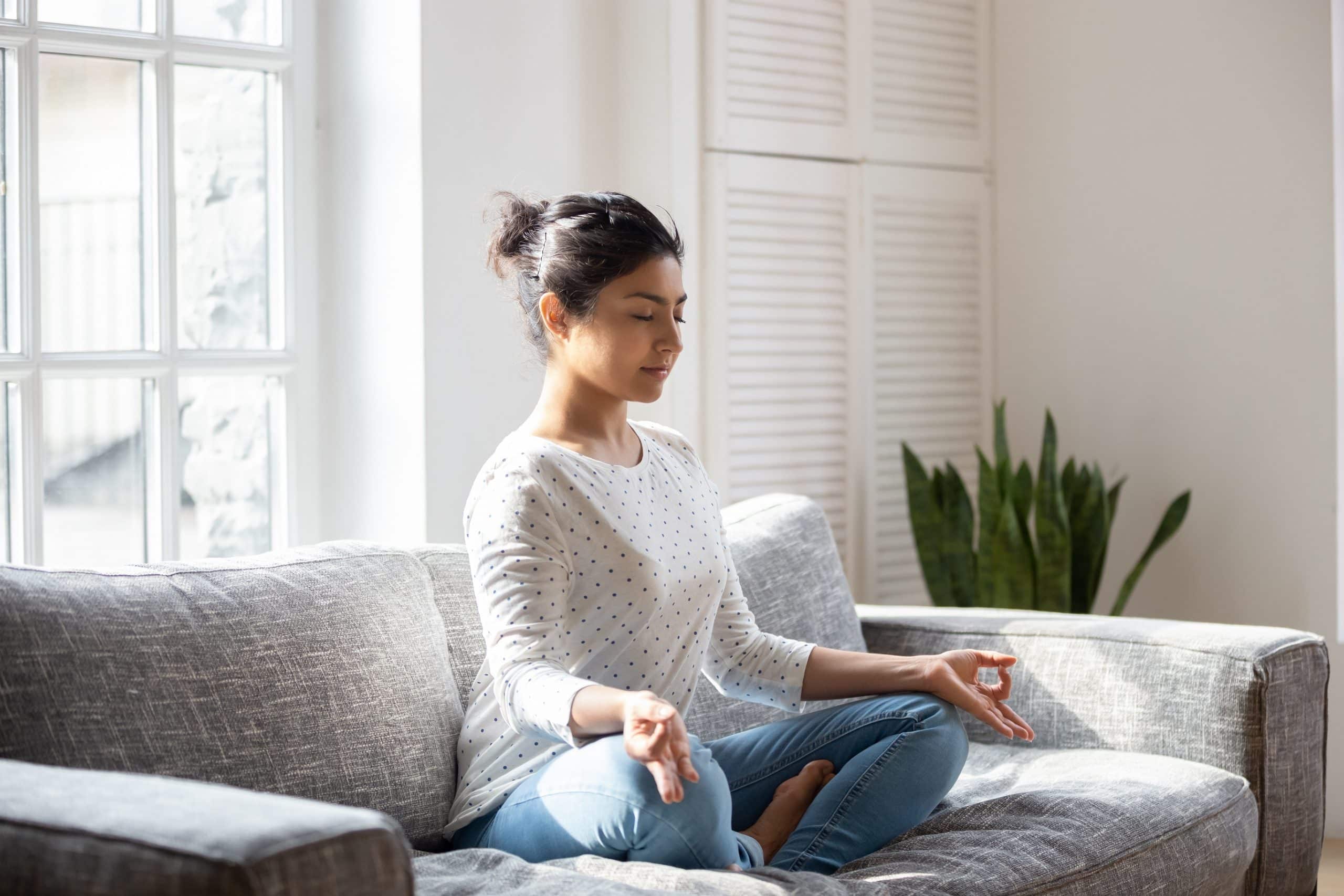Have you ever found yourself crying during meditation? If so, then you are not alone. This is something that happens to quite a handful of people. Shedding a tear while in the middle of a meditation session can come as a shock to many. After all you were probably doing this exercise to help calm your mind and destress only to find yourself overwhelmed with emotions and breaking down. In this article, we are going to find out what crying during meditation means, why you are likely to start crying during meditation, as well as share some advice on how to deal with these strong emotions.
Crying During Meditation: Is It Normal And Why Does It Happen?
Yes, it is. Meditation is a continuous practice that helps you to train your mind, create a heightened state of awareness, and focus your thoughts. This practice has become quite popular because of its benefits, which include:
- Reducing symptoms of stress and depression
- Controlling anxiety
- Promoting kindness and compassion towards yourself and others
- Increasing imagination and creativity
- Improving focus and attention
- Relieving headaches
- Promoting mindfulness
- Improving sleep
- Controlling chronic pain
When we think about meditation, these are the benefits that we think about and for the most part, sitting down, emptying your mind and focusing on your breathing for a few minutes each day will give you these benefits.
However, what we do not think about is that, when our minds are empty of the constant stream of distracting thoughts, that is when some of our most buried and sometimes unresolved feelings can tend to resurface. When these emotions appear suddenly you may find yourself wholly overwhelmed to a point where you start crying intensely during meditation.
Read More: Mindfulness Tips: Practical Ways To Improve Your Awareness And Bring Balance To Daily Life
So, What Does It Mean If You Start Crying During Meditation?
Crying during meditation is often a manifestation of unresolved and suppressed emotions in our subconscious. When your mind is free of thought, you are able to take a good look into yourself. And when you do, you may not always like what you see. This, however, is not a bad thing.
Shedding a tear during this practice, or completely breaking down is healthy for you. It means that you are getting in touch with yourself. It gives you a chance to examine yourself, your emotions, let them out and gives you a chance to heal.
An important fact to note is that crying during meditation can be a result of negative or positive triggers. Here are some of the reasons why you may find yourself tearing up during your zen time:
Whether you want to learn how to exit the spiral of self-harming behavior, overcome anxiety, cure insomnia or simply give yourself the time and space to bliss out and soak up the moment of complete peace and quiet – BetterMe: Meditation & Sleep app is exactly the tool for that! If you don’t take care of number one, who will?
-
You Have Achieved Self-Awareness
In psychology self-awareness is defined as the ability to see yourself clearly and objectively through reflection and introspection, and in relation to emotional intelligence it is defined as the ability to understand your own emotions and their effects on your performance.
Self-awareness helps you understand what you are feeling, why you are feeling this way and how these emotions are helping or hurting you. While many of us would like to believe that we are self-aware, the truth is that we are not.
Meditation is one tool that helps us become more in touch with ourselves. A downside of this is that we may realize that we are not as great as we thought we were. Awareness can highlight our faults which may end up making us cry during meditation.
-
A Sudden Wave Of Happiness And Peace
As stated before, crying during meditation is not always a result of a negative trigger. Feeling deeply happy and at peace is one thing that could make you shed a tear while meditating.
-
A Deep Sense Of Gratitude
Gratitude meditation is a meditation technique that asks practitioners to list down the things that they are happy and grateful for. This practice is known to help increase our optimism, relieve depression, improve immune function, lower blood pressure and strengthen our relationships with those around us.
An obvious fact is that this practice will automatically increase our feelings of gratitude. Realizing that you are surrounded by blessings and love during this exercise could lead to crying intensely during meditation; not because you are sad but because you are happy and feel very lucky.
-
You Achieve Self-Compassion
Self-compassion is a feeling of warmth and understanding toward ourselves when we suffer, fail, or feel inadequate. More often than not, we tend to criticize ourselves quite harshly for our failures and inadequacies. Meditation can help us be kinder and forgive ourselves, which could lead to shedding a tear or two.
-
The Release Of Unpleasant Emotions
Meditating is a great way to try and solve problems. If you have been carrying around feelings of guilt, hurt, or anger, taking some time to meditate helps you sort through these negative emotions and release them, so they may no longer burden you. This act could lead to crying during meditation as you are no longer burdened by these negative feelings.
-
You Have Gained Awareness Of A Certain Truth
This can be a good thing or a bad thing. On the positive side, this practice can help you realize that you are surrounded by love and not as lonely as you may have assumed before which could trigger strong emotions, thus making you cry.
On the flip side, it could help put into perspective the fact that you are not happy with yourself, your lifestyle, your job, or someone in your life. This then triggers feelings of pain or sadness, which could make you start crying during meditation.
What To Do When You Start Crying During Meditation?
Let’s be honest, the knee-jerk reaction that most of us would have when we realize that we are crying during meditation is to quickly put a stop to it. This, however, is not the right thing to do. Here is what to do when you realize that you are crying during chakra meditation (or any other form of meditation):
-
Acknowledge The Feeling That Is Making You Cry
Whether it is a good or bad feeling, acknowledge it and take a minute to examine it. Most of us are not usually ready to face the negative feelings in our lives. We beat them down and bury them deep choosing to move one without dealing with them. When they pop up during meditation, resist the need to bury them again, and this time examine them. All your emotions, whether good or bad are valid and dealing with them will help you release them and unburden yourself.
-
Cry It Out
Crying is never a bad idea. In fact, having a good cry has several benefits including improving sleep, boosting your mood, releasing toxins and hormones that contribute to elevated stress levels, relieving pain and de-stressing as well as strengthening the immune system (3). Whether you are crying tears of joy or sadness, let the tears flow unabashedly.
-
Talk To Someone About It
Crying during meditation can leave you feeling raw and vulnerable. Once you are done with your session, take some time to talk to someone you trust about your experience and feelings. This will help you unburden yourself even more.
-
Try Journaling
If you do not have someone to talk to, then this may be a good option for you. Journaling has continuously gained popularity in recent years and for good reason. This practice helps keep your thoughts organized, boosts memory, and improves creativity, among many other benefits. In terms of mental health journaling can help you manage anxiety, reduce stress, and cope with depression (1).
Once you are done crying, take out your journal and list down the reasons that made you start crying during meditation. If the reasons for you tearing up were bad, this practice will help you prioritize the problems, fears, and concerns plaguing you. It also gives you a great opportunity to practice positive self-talk, which can help do away with any negative feelings towards yourself that may have arisen as you were meditating.
With stress being a constant presence in our lives, taking time to process emotions, decompress and get into the right frame of mind is absolutely crucial. With BetterMe: Meditation & Sleep app your mental health is in good hands! Start using it now!
What Happens When You Meditate?
This practice affects both our minds and bodies in different ways. Here is what happens to your brain when you meditate.
Through the use of MRI scans, scientists have found out that this practice causes our brains to take a break and stop processing information as actively as they normally would during other times. Here is what happens to different parts of the brain during meditation:
- The frontal lobe. This part of the brain is important for voluntary movement, expressive language and for managing higher level executive functions. These executive functions include the capacity to plan, organize, initiate, and self-monitor. During this exercise, the frontal lobe ‘goes offline’.
- The thalamus. This part relays motor and sensory signals to the cerebral cortex. As you meditate the flow of incoming information slows down. The deeper you are in meditation, the less information this part of the brain receives.
- The parietal lobe. When meditating this part slows down. This lobe is located in the upper back area in the skull and it processes sensory information mainly relating to touch, taste, and temperature.
- Reticular formation. This part is best known for its role in promoting arousal and consciousness. Meditation puts your feelings of arousal on hold for the duration of the practice (and even for sometime after you are done).
What about our bodies? What effect does this practice have on them?
Meditation helps decrease metabolism, eases chronic pain, lowers blood pressure, and improves heart health and heart rate (it reduces high blood pressure in the long-term).
It also improves breathing, can boost your mood and improves your immunity. In relation to women’s health, this practice is said to help with PMS (premenstrual syndrome) – reduces hot flashes, breastfeeding in news mothers – boosts the production of milk -, as well as infertility problems in women trying to conceive.
Falling Asleep During Meditation: Is It Normal And How Can You Put A Stop To It?
Like crying during meditation, falling asleep during meditation is a common occurrence. It may surprise you that this is not only a problem for beginners, but for advanced and long-term meditators too. Despite it being quite common, it can also be frustrating, especially if you are trying to learn the practice, or use it to work through some issues.
The reason why we may find ourselves snoozing and taking a quick power-nap while meditating is very simple. As a beginner, it can be really hard to find the perfect balance between focus and relaxation. While some people find it hard to relax, you are relaxing a little too much, more than is required for meditation and falling asleep.
Remember that meditation is all about balance. If you fall asleep, appreciate the nap and try again next time. Here are some tips that may help you stay awake the next time you choose to try meditating:
- Do it while sitting upright. Lying down while meditation can encourage you to sleep. However, when you are seated, you are less likely to doze off because the position is not the most relaxing and if you sleep, you might end up falling down.
- Do not meditate in bed. This applies the same logic as meditating while lying down. A warm comfortable bed encourages sleep.
- Try sitting in front of a window or outside on the balcony. The fresh air and breeze (if any) will help keep you awake.
- Choose to meditate in the morning rather than at night. Trying to meditate when you are exhausted after a long day will most likely end up with you falling asleep.
- Do not meditate right after waking up. Your mind and body are not fully awake yet, and thus you are likely to doze off. Once you get up, walk around a bit, brush your teeth, have a cup of tea, then meditate.
- Get out of the house. You do not have to only meditate in the house. Meditate as you take a walk in nature, sit outside on a park bench or lie under a tree outside.
- Do not meditate after having a big meal. Large and heavy meals always put you in a drowsy state. If you choose to do this calming exercise after a big meal, then you will most probably end up falling asleep during meditation.
Read More: Does Meditation Work: Recalibrate Your Mind To Relax And Stop Dwelling On The Negative
What Is Meditation Like?
If you are wondering what meditation feels like, the truth is that it really doesn’t feel like anything. There is no one word to describe what it’s like. The practice requires you to let go of all thoughts, relax and accept things as they are and as they may come. However, if you want to know if meditation is working, this is what you might experience:
- You are sleeping better
- You are worried less about the unknown and things you cannot control
- Your self esteem has increased and you no longer rely on the validation of others to see your worth
- You feel less nervous and anxious
- You are happier and more relaxed
- Better concentration
- You are kinder to yourself and others
- You are more imaginative, creative, and less self-centered
What Is The Purpose Of Mantra During Meditation?
What is a mantra in meditation? The word ‘mantra’ actually comes from two Sanskrit words ‘man’ which means mind and ‘tra’, meaning release or a vehicle, instrument, or tool which helps transport the mind from a state of activity to one of stillness and silence (2). In short a mantra is a tool of mind/thought that helps harness and focus the mind.
The main purpose of a mantra during meditation is to help keep you focused on the task at hand. Concentration during this exercise is not often easy to come by and many people find their minds wandering. However, having a phrase to repeat over and over helps keep your mind from drifting. A mantra can also help reinforce your meditation goals. For example, if you are meditating for anxiety or depression, repeating phrases such as ‘All is well, I am enough, or This too shall pass’, can help pull you out of this state.
The Bottom Line
Crying during meditation is normal and no one should feel any shame for doing it. It shows that you are getting in touch with your emotions and starting to become more self-aware. Whether you are crying tears of joy, gratitude, sadness, or anger let the tears flow and cry to your heart’s content. Once you are done, if your tears were from negative emotions, take some time to analyze your feelings, where they came from, and what you can do to change the situation that is making you feel this way. This helps you be rid of any suppressed feelings that may be bringing you down.
DISCLAIMER:
This article is intended for general informational purposes only and does not address individual circumstances. It is not a substitute for professional advice or help and should not be relied on to make decisions of any kind. A licensed physician should be consulted for diagnosis and treatment of any medical conditions. Any action you take upon the information presented in this article is strictly at your own risk and responsibility!
SOURCES:
- Journaling for Mental Health (n.d., urmc.rochester.edu)
- Scientific Analysis of Mantra-Based Meditation and its Beneficial Effects: An Overview (2017, researchgate.net)
- Why You Should Cry – 5 Reasons to Let It All Out (2016, pennmedicine.org)


















